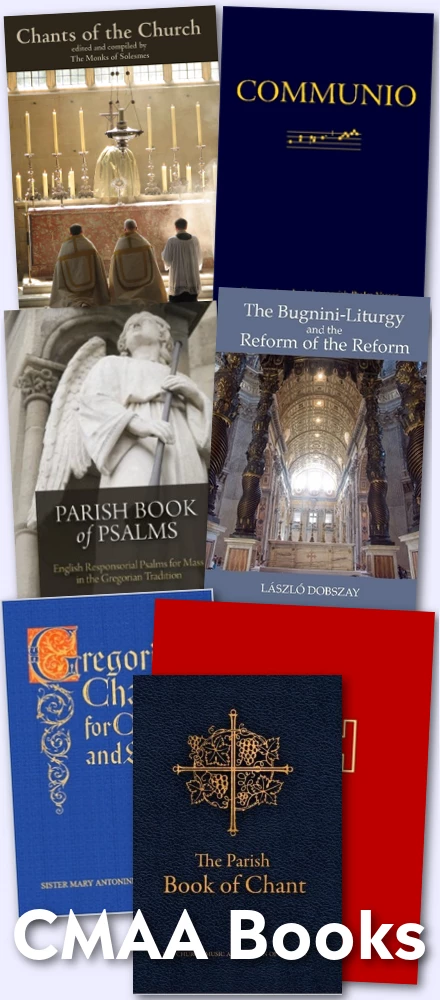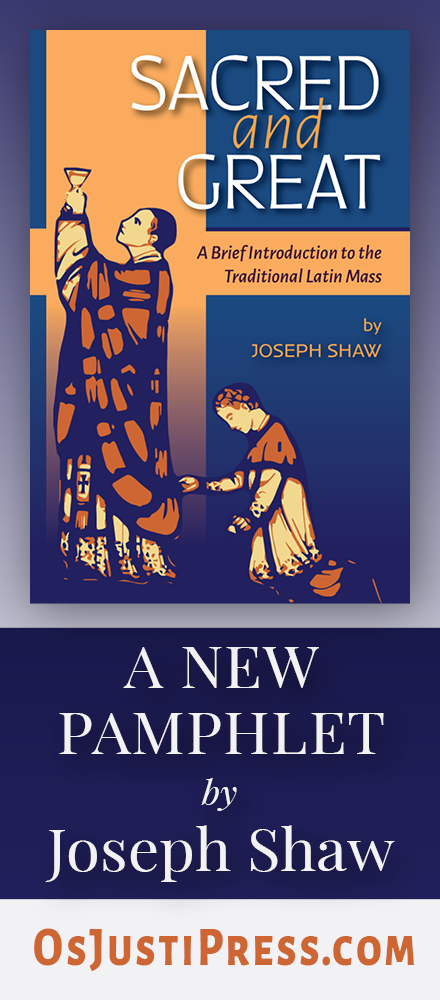Here is an interesting and thought provoking talk by Jeffrey Ostrowski. It deals with the quality and style of music that is truly suitable for liturgy.
Thursday, May 27, 2010
What is Dignified Music
UnknownMore recent articles:
Chant Camp in Northern California, August 4-8Jennifer Donelson-Nowicka
Chant Camp for Singers Ages 8-17, August 4-8, at St. Patrick’s Seminary in Menlo Park, California.Early bird pricing through June 25th | Discounts available for multiple children from the same family.More information and registration available here. Discover the joy of singing the Church’s sacred music!The Catholic Institute of Sacred Music launche...
The Byzantine Gospel of PentecostGregory DiPippo
After Nicodemus’ discourse with Christ in chapter 3, he will appear two other times in the Gospel of St John. At the end of chapter 19, he comes to help Joseph of Arimathea bury the Lord, bringing myrrh and aloe. Before that, he is mentioned in chapter 7, in the passage which the Byzantine Rite reads on Pentecost Sunday. (John 7, 37-53 and 8, 12) ...
The Vigil of Pentecost 2025Gregory DiPippo
IN those days: The hand of the Lord was upon me, and brought me forth in the spirit of the Lord, and set me down in the midst of a plain that was full of bones. And he led me about through them on every side; now they were very many upon the face of the plain, and they were exceeding dry. And he said to me, “Son of man, dost thou think these bones...
No Gospel for Pentecost? A Radical Proposal Made to the ConsiliumGregory DiPippo
If one honestly compares the Roman Rite and the post-Conciliar rite, one will inevitably wind up asking oneself, frequently, Why on earth did they change or delete X, Y or Z feature of the historical liturgy? How did we benefit from this? This coming week, from which the very rich and ancient liturgy of the Pentecost octave was deleted, is one of t...
The Holy Ghost Hole, AddendumMichael P. Foley
Pfarrkirche Lunz am See: Lunz Parish Church, AustriaThere is a special joy in seeing something that one has only read about for years. I experienced this joy in Lunz am See, Austria, last week. This tiny town in Lower Austria, not far from the crystal-clear lake of Lunzersee, has a quaint parish church that was built around 1502. It is described bo...
Tradition is for the Young - Photos of Recent Pontifical MassGregory DiPippo
On May 18, the Fourth Sunday after Easter, His Excellency Ronald Gainer, Bishop Emeritus of Harrisburg, Pennsylvania, celebrated a pontifical Mass in the traditional Roman Rite at St. Joseph’s Church in Lancaster, Pennsylvania. The Mass was sponsored by our friends at the Durandus Institute; the program of sacred music included Victoria’s Missa O Q...
The Octave of the Ascension 2025Gregory DiPippo
From the homily of Pope St Gregory the Great read on the octave of the Ascension in the Roman Breviary. Concerning the glory of (Christ’s) Ascension, Habakkuk also said, “The sun was lifted up, and the moon stood still in her rank.” (3, 10-11) Who is here signified by the name of the Sun, if not the Lord, and by the name of the Moon, if not the Chu...
Practical Steps for Transitioning from the 1962 to the Pre-1955 Roman Rite—Part 1: IntroductionPeter Kwasniewski
The author of this series wishes to remain anonymous. He is an experienced master of ceremonies and chanter, intimately familiar with both the 1962 rubrics and the pre-1939 rubrics in ordinary parish contexts.In the summer of 2022, almost as if to mark as well as the first anniversary of the lamentable papal motu proprio, Paul Cavendish and Peter K...
A Sequence for the AscensionGregory DiPippo
For the ongoing feast of the Ascension, here is a sequence for it which was sung in the Uses of Sarum, York, and Hereford in England, and in those of Paris and Sens in France. (Despite its great antiquity, and its status as the capital of France, Paris was a suffragan diocese to Sens until 1622.) It is attributed, though far from certainly, to the ...
Icon Painting Workshop in Crete, August 1-10th, taught by George KordisDavid Clayton
I will be attending this 10-day residential course this summer. It welcomes all, from absolute beginners to seasoned artists, and can be a masterclass for professionals.Writing the Light is a program of instruction in traditional Byzantine-style iconography that offers comprehensive training through its Certificate Program, from soup to nuts. Their...




















